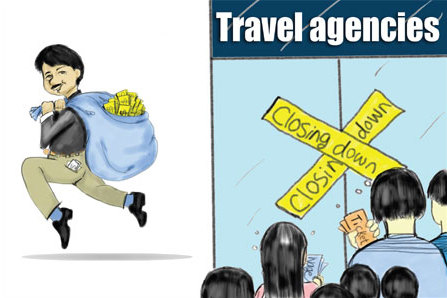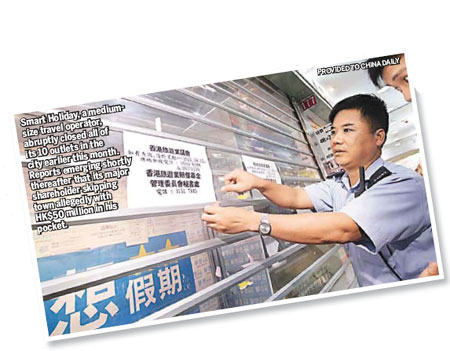Holidays for charlatans
Updated: 2013-01-25 06:45
By SL Luo(HK Edition)
|
|||||||

|
Smart Holiday, a medium-size travel operator, abruptly closed all of its 10 outlets in the city earlier this month. Reports emerging shortly thereafter that its major shareholder skipping town allegedly with HK$50 million in his pocket. |
Hong Kong, known as the world's freest economy, must take heed of some negative factors. There are, for example, unscrupulous bosses who shut their businesses around this time of year and abscond with monies belonging to clients or employees. Demands for tougher laws, however, inevitably encounter stiff resistance from business people themselves. SL Luo reports.
Alice Li feels like the victim of plain old "bad luck." She loves to travel and while she hardly considers herself a member of the jet-set, she's had what she considers to be more than her fair share of run-ins with irresponsible and unscrupulous travel operators.
The retired musician had made a practice of taking her family on holiday trips every other year. Then came her first disaster. She'd forked out a six figure sum to a travel agency to pay for a European package tour. The trip never got off the ground. The Hong Kong travel agency that took her money went bust just before Lunar New Year.
There was no Travel Industry Council (TIC) to act as watchdog back then, or to indemnify travelers against loss. Li lost her money and didn't even have the satisfaction of having anyone who could hear her complaints.
"We were devastated as we had planned our trip months ahead," she recalled. "The incident left an indelible stain on our travel industry. I shudder when somebody mentions going on those tours," Li says.
"I would like to see the authorities take appropriate action to stop such malpractices which have seriously damaged Hong Kong's image in the eyes of tourists and dealt a blow to its standing as the world's freest economy," she says.
Li's experience was nothing new. Key local industries, notably travel and catering, are teeming with slimy operators who prey on unsuspecting customers, especially during the festive season.
Over the past two decades, around Lunar New Year almost every year, a half a dozen restaurants or travel agencies abruptly have ceased to do business, on average. Unscrupulous owners have absconded with the unpaid wages of their employees and millions of dollars in advance payments for New Year's banquets or holiday tour package that never will happen.
Victims are left high and dry. Their losses run into tens of millions of dollars.
History appeared to repeat itself last month. Smart Holiday - a medium-size travel operator in Hong Kong - abruptly closed all of its 10 outlets.
The company claimed it was mired deep in a financial crater, burdened with debt, unable to keep up with sky rocketing rents and so on and so forth. Reports emerging shortly thereafter, however, painted a different picture of the company's major shareholder skipping town allegedly with HK$50 million in his pocket.
The Travel Agents Registry (TAR), which keeps tabs on the businesses and management of local travel agencies, claims it had maintained "close surveillance" over Smart Holiday's operations before the shutdown. Shareholders and directors were summoned to two meetings to explain the company's financial situation.
By that time, alarm bells already were ringing. The company already had announced the closure of three of its branches, complaining it could not justify maintaining the branches with revenues unable to maintain pace with high rents.
In the end, however, regulatory oversight failed. Members of the TAR were hoodwinked by company managers who led them to believe the company was sitting on a heap of cash that was to be injected into the company. Based on that premise, Smart Holiday was given a one-month extension of its license. The money that had been promised failed to materialize. The one month license extension proved to be a disastrous mistake.
Nearly HK$53 million disappeared in a puff of smoke, money that had been paid for 170 tours, involving nearly 2,000 travelers.
The Travel Agents Ordinance, which is responsible for the licensing of Hong Kong's travel firms, also sets rules for the management of the Travel Industry Compensation Fund (TICF). The fund provides ex-gratia payments to outbound travelers hurt by travel agents that have gone out of business.
The government, reeling from the unceasing shutdowns by shrewd, deceitful travel operators is preparing to hit back.
New legislation is being drafted to replace the existing ordinance with one that has sharper teeth. A new Travel Industry Authority may be up and running soon. It will be mandated as the travel industry's official regulatory body, given full charge of all licensing procedures.
"In drafting the new legislation, the government will continue to listen to the views of the public and the trade to iron out the detailed arrangements to improve the regulatory regime," a spokesperson for the Travel Agents Registry (TAR) said.
The TAR has the right to refuse a license to any travel firm, if the applicant or director is deemed "unfit"or an "improper person" to conduct the business of a travel agent.
Under the current laws, the TICF extends up to 90 percent of the total outbound fare already paid by travelers in the event of an agency going bankrupt or going into default. Payment is to be made within 90 days of application.
Since January 2007, more than 1,700 Hong Kong travelers have been affected by defaults of travel company operators and have applied for ex-gratia payments totaling HK$2.5 million from the TICF.
Some of the biggest cases involved Observers Travel and Kwan's Travel which defaulted in 1996 and 1999. The TICF gave out HK$4 million and HK$4.3 million.
If criminal activity is suspected, cases are referred to police. Twelve such cases were sent to the police for investigation between 2007 and last year. But, only one, Victoria International Travel, resulted in a criminal conviction and imprisonment.
TIC Executive Director Joseph YC Tung, who is also a TICF board member, says he does not think the current situation involving unscrupulous travel operators has become a crisis.
"All these years, such cases are not too many. The Travel Agents Registry keeps a very tight check on them. The minute any sign of trouble is detected, action will be taken.
"If serious abnormality is suspected, it will be referred to the police or the Independent Commission Against Corruption," he said.
Tung also expressed satisfaction that the travel industry is the only industry in Hong Kong where compensation is awarded to people affected by wrongdoing of business operators. "No other sector offers such compensation terms here."
According to Tung, the TIC has received 260 complaints from people affected by Smart Holiday's shutdown. "Some of them approached us directly while others chose to go straight to the TICF."
Hong Kong travel agents pay a levy of 0.15 percent into the TICF fund for each outbound tour. "To date, we have an accumulated fund of HK$580 million and we should be able to look after those in need if and when the time comes," Tung says.
The proposed reorganization of travel agency control regulations has met with praise from trade unionists and legal experts and with opposition from the business community. The objection from the business sector is that tighter regulations on the industry could do more harm than good to Hong Kong's status as the world's freest economy.
The catering industry, perhaps, ranks second after the travel trade, when it comes to year-end legerdemain.
Employees expecting to have plenty of work during Spring Festival staff and family banquets have been the biggest casualties. Restaurants fold, workers are stranded with unpaid wages or they receive payment in non-sufficient funds (NSF) checks.
The Labour Department dealt with a total of 86 labor disputes and more than 18,000 claims in 2011 alone. At the same time, all-out efforts have been made to combat wage offenses, including violations of statutory minimum wage provisions.
In one of the few known cases involving restaurant operators, the owner of a seafood restaurant was convicted last year and jailed for three years for swindling his workers and lying to the liquidator.
The businessman, who was also barred from serving as a company board director for five years, had squandered nearly HK$1 million from the restaurant, closed it and laid off all his employees, before moving on to open four new restaurants in succession.
He was condemned by the judge as a "cancer on society."
Kelvin Ng, a partner with a notable local law firm, is in favor of stricter regulations to punish deceitful business operators although pressure to resist the tighter regulations has come from the business sector itself.
Ng warns that similar episodes will recur, unless operators get the message loud and clear, that it will no longer be easy for them to carry out their criminal acts with such relative ease and impunity.
"In my view, the biggest obstacle lies with the 'limited company' where directors are exposed to limited liability. The laws aren't strict enough. They have to be changed to deal with the same situation that has occurred again and again," Ng told China Daily.
"The loopholes, or grey areas in the law, allow for that. Any company director or operator can claim that money has been lost through bad investment or business having turned unprofitable. They can just close up shop and reopen later. It's not a crime on the surface of it," he argues.
"Hong Kong prides itself on being a world city with the freest economy. But, this is the price we have to pay for the accolade," he adds.
In Ng's view, one of the problems is that there aren't enough objections from the public. "The business people themselves are not in favor of tougher regulations since it would go against their own interests. One way is to bar company directors from becoming shareholders of any other enterprises within certain specified periods after they have been found to have committed malpractices detrimental to their industry," he reckons.
(HK Edition 01/25/2013 page4)
